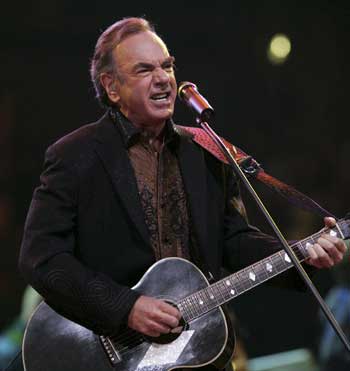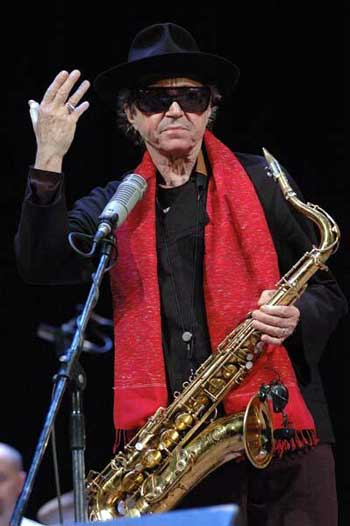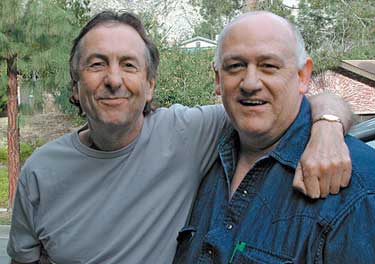Neil Diamond at the Verizon Center
___________________________________________________________________________________
 Photo by Katie FalkenbergThe stretch limos were lined up fatly outside the Verizon Center on Tuesday night, disgorging a steady stream of Gucci loafers, well-cut suits and expensively understated jewelry. Little wonder — Neil Diamond was in town, and a generation that came of age to "Sweet Caroline" was not about to miss the event.
Photo by Katie FalkenbergThe stretch limos were lined up fatly outside the Verizon Center on Tuesday night, disgorging a steady stream of Gucci loafers, well-cut suits and expensively understated jewelry. Little wonder — Neil Diamond was in town, and a generation that came of age to "Sweet Caroline" was not about to miss the event.
Over the past 40 years, Mr. Diamond has become a venerable American icon, racking up record sales of 125 million. And as he proved in a roaring two-hour concert, he's still going strong — and his fans are as crazy about him as ever.
Those who loved the Neil Diamond of old — the one who performed in spectacularly garish shirts and milked the sap from every last note — were in for a surprise, though. At 67, the singer-songwriter has largely toned down his famous flash. Dressed almost starkly in a black jacket and pants, with a brown embroidered shirt that lacked even a single sequin, Mr. Diamond sang with little of the overwrought drama that often turned his performances into schmaltz. Older and wiser now, he largely put the focus back on the music itself.
It worked. The near-capacity crowd went into rapture from the opening notes of "Holly Holy" and stayed that way through an evening that included almost two dozen of Mr. Diamond's greatest hits.
The singer clearly was having a great time, strumming a black guitar and floating around the stage on a moving platform. His inimitable baritone isn't as supple and resonant as it once was — it has an agreeable, weathered edge to it now — but he's a powerful singer, a natural performer and, apparently, still a sex symbol.
"Shall we dance?" he flirted with the audience, which rose en masse for "Cherry, Cherry," wives pulling husbands to their feet. When he stripped off his jacket in "Thank the Lord for the Night Time," the arena filled with so much female cheering that even the horn section was drowned out. On it went, as Mr. Diamond — backed by a full band and three backup singers — stormed through feel-good favorites from "I Am ... I Said" and "Beautiful Noise" to the heartfelt "Play Me."
"But that was then, and this is now," he said, introducing three songs from his intriguingly personal new Rick Rubin-produced album, "Home Before Dark." Opening with the introspective title track — a song of rare beauty — and moving on to "Don't Go There" and "Pretty Amazing Grace," he showed a new side of himself — quieter, subtler and far more intimate than the stadium-sized emotionalism of his big hits.
Good as they were — and they were superb — the new songs met with only polite applause; the audience really was there for the favorites, and Mr. Diamond obliged them. "Solitary Man" and "Forever in Blue Jeans" got the crowd to its feet, but the high point came in the classic "Sweet Caroline." Arms in the air, the audience sang the refrain of "so good, so good, so good" at the top of its lungs — ending in such deafening applause that Mr. Diamond brought the song back for two more choruses.
Things got more than a little kitschy during "You Don't Bring Me Flowers," when Mr. Diamond sat at a table with a wineglass and a single rose to sing a duet with backup singer Linda Press. "Brooklyn Roads" — which featured home movies from Mr. Diamond's youth projected onto giant screens over the stage — overflowed with earnest sincerity. However, the gospel-inflected "Man of God" and "Hell Yeah" came off with real conviction, and the closing encores (which included "Cracklin' Rosie" and "America") were pure Diamond: big, heartfelt and larger than life in every way.
Gato Barbieri at The Birchmere
____________________________________________________________________________
 Gato Barbieri has left a lot of disappointed jazz fans in his wake over the past few decades. From the fire-breathing avant-gardist of the 1960s, the Argentine saxophonist has slowly reduced himself to squishy blandness, churning out everything from film scores to Latin jazz to, most recently, smooth-jazz schlock that leaves early fans shaking their heads in despair.
Gato Barbieri has left a lot of disappointed jazz fans in his wake over the past few decades. From the fire-breathing avant-gardist of the 1960s, the Argentine saxophonist has slowly reduced himself to squishy blandness, churning out everything from film scores to Latin jazz to, most recently, smooth-jazz schlock that leaves early fans shaking their heads in despair.
The set drew heavily on Barbieri's Latin period, and he brought some fine surprises to songs like "Fiesta" and "I Want You," while the refuses-to-die classic "Europa" had several couples slow-dancing in the aisles. There may be no hope for the corny ballad "She Is Michelle," but a lively, up-tempo version of "Summertime" was brilliant by any standard.
In fact, the only odd note in the evening was Barbieri himself, whose stage presence was dyspeptic, to say the least. Whether staring out glassy-eyed at the audience, bending over to croak a few words into a waist-level microphone, or stepping all over the solos of his fine four-piece band, Barbieri seemed to be enduring the evening, rather than enjoying it.
"Not the Messiah" at Wolf Trap
___________________________________________________________________________
 Most of the world's great oratorios, it's probably fair to say, don't generate a lot of belly laughs. But then again, most oratorios don't feature a Bob Dylan imitation, a troupe of bagpipers, three stuffed sheep and a musical leaf-blower -- all of which appeared at Wolf Trap on Thursday night in Eric Idle's hysterically funny new production, "Not the Messiah (He's a Very Naughty Boy)."
Most of the world's great oratorios, it's probably fair to say, don't generate a lot of belly laughs. But then again, most oratorios don't feature a Bob Dylan imitation, a troupe of bagpipers, three stuffed sheep and a musical leaf-blower -- all of which appeared at Wolf Trap on Thursday night in Eric Idle's hysterically funny new production, "Not the Messiah (He's a Very Naughty Boy)."
Idle, of course, is one of the geniuses behind Monty Python's Flying Circus, and here he reinvents the classic Python film "Life of Brian" along the lines of Handel's stately, reverential "Messiah."
It's a spectacularly loony idea, and Idle and his collaborator, composer John Du Prez, brought it off brilliantly. The fable of Brian Cohen (who was born on the same day as Jesus and, despite his best efforts, is thrust into the role of religious leader) is a finely tuned satire that skewers human stupidity across the board, from mindless fanatics to petulant would-be revolutionaries.
Perfect material, in other words, for a 21st-century oratorio. Idle rewrote the film's key scenes as songs, which Du Prez then set to music with gleeful abandon -- mixing spirituals, doo-wop, Scottish ballads, Sondheim-ish show tunes, John Philip Sousa and even a tip of the hat to Handel himself.
Du Prez conducted the National Symphony Orchestra and the Master Chorale of Washington with a light touch, and there were fine turns by the four soloists, particularly the young tenor William Ferguson in the role of Brian. But it was Idle himself who stole the show (his dead-on Dylan impersonation will go down in musical history). After the show closed with a singalong of "Always Look on the Bright Side of Life," the audience brought him back for three curtain calls.
Kenny Loggins at the Birchmere
______________________________________________________________________
 The music of Kenny Loggins is lodged deep in the baby boomer psyche -- the soundtrack to every rite of passage on the road to middle age. How many seductions in the 1970s were conducted to "Danny's Song"? How many '80s weddings featured "Forever"? How many of the resulting babies were burped to the gentle strains of "House at Pooh Corner"? The numbers are incalculable.
The music of Kenny Loggins is lodged deep in the baby boomer psyche -- the soundtrack to every rite of passage on the road to middle age. How many seductions in the 1970s were conducted to "Danny's Song"? How many '80s weddings featured "Forever"? How many of the resulting babies were burped to the gentle strains of "House at Pooh Corner"? The numbers are incalculable.
So it's no wonder that Loggins sold out two shows at the Birchmere this week, rewarding the faithful with a mix of classic favorites and newer songs from last year's CD, "How About Now." Fronting a tight four-piece band, Loggins was in fine form on Tuesday night, looking and sounding far younger than his 60 years and still very much the boy-next-door of soft rock: upbeat, non-threatening and astoundingly gifted.
Most of the set was devoted to early songs, a few of them souped up for the 21st century. After opening acoustically with "Danny" and "Pooh," Loggins plugged in for hard-rocking anthems "Your Mama Don't Dance" and "Angry Eyes," led a falsetto-tinged singalong to "Celebrate Me Home," crooned the maudlin "The One That Got Away" and got the crowd roaring with the eternally irresistible "Footloose."
But it wasn't just a nostalgia-fest. "How About Now" never got much play (marketed exclusively through Target, it somehow failed to sell -- go figure), so Loggins is rereleasing it next month on a new label. And to judge by new tunes like "I'm a Free Man Now" and the title track, Loggins is writing as well as he did in his heyday -- still a master of the melodic hook and the diabolically catchy rhythm, but digging into the tough, painful issues of adult life.
At the Alexandria Guitar Festival
_______________________________________________________________________________
 One of the most exciting (if little-known) gems of the summer music season is the Alexandria Guitar Festival -- an intensive week of concerts and master classes held at the George Washington Masonic Memorial every July. Classical guitarists from around the country flock to it -- there's a stack of guitar cases in the lobby before each concert -- and the performances, as you'd expect, push the upper limits of virtuosity. It's a place to catch up with some of the most striking young players in the world.
One of the most exciting (if little-known) gems of the summer music season is the Alexandria Guitar Festival -- an intensive week of concerts and master classes held at the George Washington Masonic Memorial every July. Classical guitarists from around the country flock to it -- there's a stack of guitar cases in the lobby before each concert -- and the performances, as you'd expect, push the upper limits of virtuosity. It's a place to catch up with some of the most striking young players in the world.
This year's events opened on Wednesday with the Italian guitarists Lorenzo Micheli and Matteo Mela, who perform together as Soloduo. Perennial favorites (this was their third year at the festival), they focused on 20th-century works that, while thoroughly contemporary, were largely tonal, romantic in flavor and profoundly lyrical. Two preludes and fugues from Mario Castelnuovo-Tedesco's "Well-Tempered Guitars," Op. 199, from 1962, mirrored each other -- the first lively and extroverted, the second as tender as a caress -- while Astor Piazzolla's "Tango Suite" from 1984 was an atmospheric work redolent of seduction and sensuality, of sultry, unbuttoned nights in Buenos Aires.
Micheli and Mela are one of the most engaging duos in classical music, and throughout the evening -- which included the wonderfully eclectic Toccata by Pierre Petit from 1959, and Joaquin Rodrigo's stunning "Tonadilla" from 1960 -- they brought near-effortless grace to everything they played. From delicate, light-as-air washes of color to unison passages in jaw-dropping precision, this was playing of rare intimacy and insight.
There was no dearth of talent for the rest of the festival: Ricardo Cobo, Andrew Zohn, the Bastepe-Gray Duo, Adam Del Monte and local heartthrob Ana Vidovic all made appearances.
But much of the attention was focused on Polish guitarist Marcin Dylla, who at 32 has won a steady string of awards -- including last year's ultra-prestigious Guitar Foundation of America International Competition.
And if there were any doubt that Dylla ranks among the most gifted guitarists on the planet, they were dispelled on Friday night. Dylla can seem a bit theatrical at times; his face becomes a twitching map of emotion when he plays. But each work on the short program -- including Nicholas Maw's brilliant, diabolically difficult "Music of Memory" -- was almost achingly poetic. This is definitely a guitarist to watch.
A Little Bach for the Doldrums
By Stephen Brookes • The Washington Post • July 8, 2008
_________________________________________________________________________ Summers can be trying for Bach lovers in Washington, when the classical concert schedule thins out and even the B Minor Mass -- ubiquitous the rest of the year -- seems to have gone to ground.
Summers can be trying for Bach lovers in Washington, when the classical concert schedule thins out and even the B Minor Mass -- ubiquitous the rest of the year -- seems to have gone to ground.
Fortunately, the Grace Church Bach Festival is filling the gap with five concerts this month at the church in Georgetown. And if the opening concert Sunday was any indication, there should be enough music from the German master to get us all through the doldrums.
The eclectic program, which mixed instrumental and chamber works with the famous Cantata No. 82, opened with two works for organ, "In Dulci Jubilo" and "O Lamm Gottes, Unschuldig," played by festival director Francine Mate. While the first lumbered along without much charm, the second unfolded with nuanced and exultant power.
Violinist Erika Sato followed with two movements from the darkly beautiful Sonata No. 2 in A Minor for unaccompanied violin (BWV 1003), bringing the Andante (surely one of the most gorgeous pieces ever written for solo violin) vividly into focus with an introspective but riveting reading.
Sato was joined by oboist Joseph Deluccio for an elegant account of the Adagio from Bach's Concerto for Violin and Oboe (BWV 1060), and Mate returned on the solo harpsichord for the Toccata in E Minor (BWV 914), which was technically able but rather bland and unfocused; you could see minds wandering all over the hall.
Fortunately, gifted young bass Jonathan Woody took the stage to sing the Cantata No. 82, "Ich Habe Genung." Overcoming some early intonation problems, Woody turned in a rich, nuanced performance and displayed a striking voice. He is a developing artist worth keeping an eye on.
The festival continues this week with performances tonight, tomorrow and Friday at 8 p.m., and Sunday at 3 p.m. Admission is by donation.


